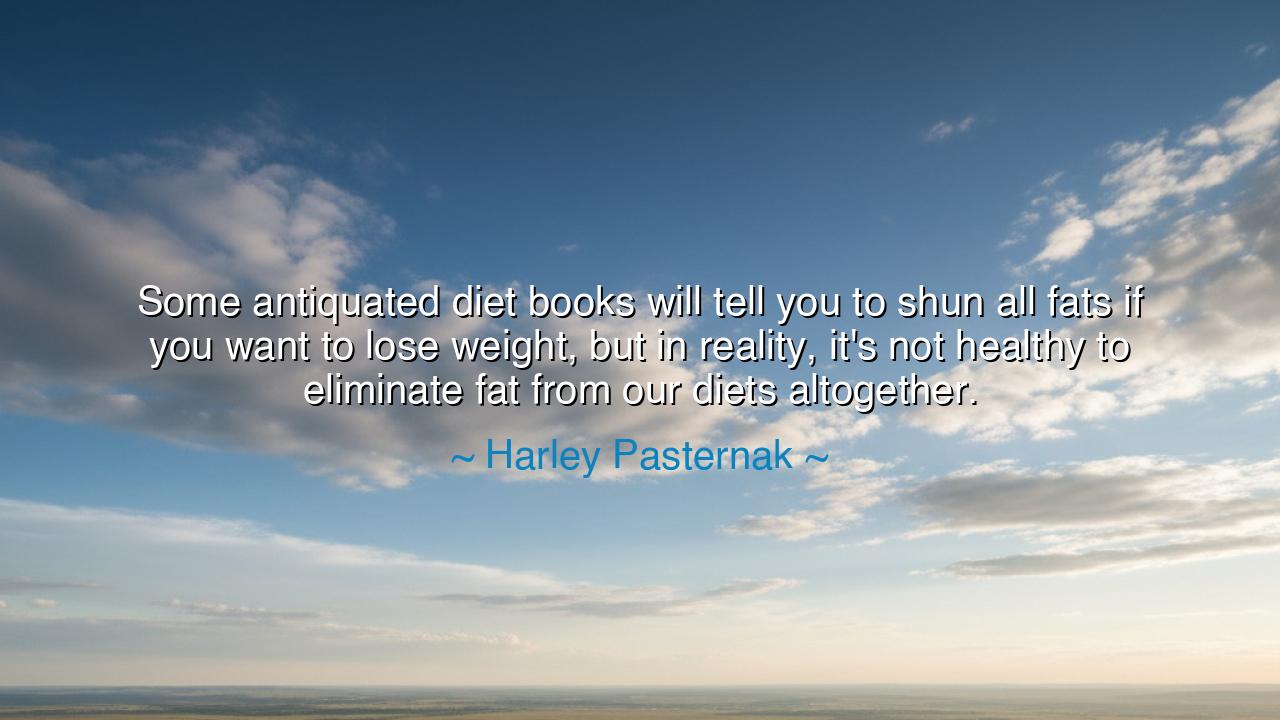
Some antiquated diet books will tell you to shun all fats if you
Some antiquated diet books will tell you to shun all fats if you want to lose weight, but in reality, it's not healthy to eliminate fat from our diets altogether.






In the wise and balanced words of Harley Pasternak, we find a lesson that reaches far beyond the table of food and into the heart of moderation itself: “Some antiquated diet books will tell you to shun all fats if you want to lose weight, but in reality, it's not healthy to eliminate fat from our diets altogether.” Though this teaching speaks of nourishment, it also whispers a deeper truth — that extremity, whether in the body or in the spirit, leads not to strength but to imbalance. In the way we eat, as in the way we live, balance is the mother of health, and wisdom is found not in denial but in harmony.
Harley Pasternak, a scholar of health and mentor to many, lifts his voice against the blind doctrines of an earlier age — a time when the fear of fat turned into a kind of faith, and people believed that purity could be purchased through deprivation. He reminds us that fats, long demonized, are not enemies but allies — that they sustain the mind, fortify the cells, and feed the flame of life. To remove them entirely is to silence one of the body’s sacred voices. This is no small teaching, for it mirrors one of the oldest truths of philosophy: what nourishes us, when misunderstood, can become what harms us; and what we reject without wisdom, we lose at our peril.
The ancients knew this law well. The physician Hippocrates, father of medicine, taught that health is not the absence of all things, but the balance of all forces. In his time, there were those who fasted to the point of frailty, who sought holiness through hunger, and who believed that denial itself was a virtue. But Hippocrates rebuked them gently, saying, “Excess, even in abstinence, is still excess.” He warned that to take away what the body needs is to offend the nature that sustains us. Pasternak’s words, though spoken in the language of modern science, carry the same timeless wisdom — that the path to wellness is not through fear, but through understanding.
In truth, the story of mankind is filled with such errors. Once, in the middle ages, the alchemists sought gold by burning away all impurities, believing that perfection came from destruction. But they learned, in time, that fire alone consumes rather than transforms. So too with the body: when we seek health through the burning away of one entire element — whether fats, carbs, or other so-called enemies — we lose the harmony that gives life its endurance. Health, like gold, is not born of fire but of careful balance, of each part working in reverent unity with the rest.
Pasternak’s message also holds a mirror to the modern soul. For what are we, in this age of extremes, if not a people who rush toward absolutes? We label foods as good or bad, people as saints or sinners, choices as pure or corrupt — and in doing so, we forget the wisdom of the middle path. In rejecting all fat, we repeat the same error we make in life: mistaking simplicity for truth. But life is not simple; it is layered, complex, and alive with dualities. Even the sweetest fruit carries a seed, and even the brightest light casts a shadow. To live well, we must learn to embrace this balance — not to fear one part of creation, but to understand how each part serves the whole.
Consider the example of the Mediterranean peoples, who for centuries have eaten olive oil, nuts, and fish rich in healthy fats, and have thrived with vitality into old age. Their diet is not one of denial but of equilibrium — a celebration of moderation, community, and respect for the gifts of nature. They do not shun fats; they honor them in their proper measure. It is this same spirit that Pasternak urges upon us: to eat wisely, not fearfully; to live with understanding, not obsession. For the body, like the earth, grows weary when we wage war against its natural order.
Let this then be the lesson, O listener: reject the extremes that promise salvation through absence. Whether in diet, in ambition, or in thought, beware the allure of all-or-nothing. Instead, cultivate balance — the sacred middle path that neither starves nor indulges. Remember that fat, like every part of creation, has its purpose; it carries energy, fuels thought, and supports life. To live healthfully, honor the wisdom of your body — give it what it needs, not what trends demand.
And in this teaching lies a greater truth still: the art of balance is the secret not only to bodily health but to peace itself. For the same principle that governs the body governs the soul — to deny entirely is to grow brittle, to indulge entirely is to decay, but to live in harmony is to endure. So, as Harley Pasternak reminds us, do not flee from what nourishes you, even if it has once been feared. Whether it be food, emotion, or truth, let nothing essential be cast aside. For the body, like the heart, flourishes not in deprivation, but in understanding — and that, in every age, is the truest science of all.






AAdministratorAdministrator
Welcome, honored guests. Please leave a comment, we will respond soon